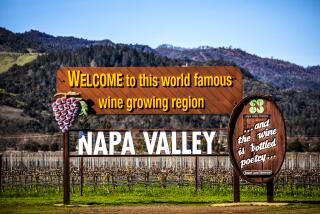An MBA offers a shortcut into the winemaking business
- Share via
A year after Aimee Chang’s father invested in a 40-acre vineyard in Napa’s prestigious Pritchard Hill area in 2010, her family decided they wanted to go beyond growing and selling grapes to making and selling their own wine.
“But we had zero experience in the wine industry,” admits Chang, 38, a licensed architect who was working in New York.
She needed to get up to speed — fast. So she enrolled in Sonoma State University’s Executive Wine MBA, the only such program in the U.S. She commuted weekly to California for almost a year and a half, graduating in 2015.
“We couldn’t have launched Nine Suns winery without that,” said Chang, who is now the winery’s director of finance and design. “Our business model grew out of a class I took on wine distribution.”
A lot of investment bankers, marketing executives, software engineers and others dream about working in wine. Some aspire to own and manage a winery; others wonder if they can shift careers by transferring their existing business skills to the companies producing the Pinot Noirs and Cabernets they’re passionate about.
The answer, says Ray Johnson, executive director of Sonoma State’s Wine Business Institute, is yes. You just need a bit of further education. While many universities have winemaking programs, Sonoma State is one of very few offering degrees in the business side of wine.
John Stayton, executive director of Sonoma State’s graduate and executive business programs, said the courses are a good way to skip the traditional ladder-climbing in learning to run a winery, which usually starts with pouring wine in a tasting room or working in the office.
The Wine Business Institute, an education and research institute in Sonoma State’s School of Business and Economics, started as an undergraduate program in 1996. It launched the U.S.’ first MBA program specializing in wine in 2008 (a 20-month course costs $25,000 to $35,000) and in 2012 added an executive wine MBA, the first in the world (weekends for 17 months, $49,500). Since then, the institute has conferred 112 graduate degrees.
The way the industry is shifting in the 21st century offers opportunities for those with skills outside it. Texan wine lover Stephanie Fanning Peachey, 38, was running a division of technology research company Lexis-Nexis when she decided she wanted a career change. While working on her wine MBA she became intrigued by direct-to-consumer marketing. (In 2017, direct-to-consumer wine sales in the U.S. increased 16% over 2016, according to a 2018 report from Sovos ShipCompliant and Wines & Vines.)
“It was a natural fit, where my previous tech and marketing experience could plug in,” she says. Now a vice president at Pinot producer Kosta-Browne, she focuses most of her time on direct-to-consumer marketing and brand strategy.
Sonoma State’s is not the only program of its kind. The Burgundy School of Business, for example, had long had wine business courses; it launched a School of Wine and Spirits Business in Dijon, France, five years ago, with master’s programs taught in English. The Wine and Spirits Institute in Bordeaux, France, has offered wine and spirits MBAs in English since 2014. And in Australia, the University of Adelaide has a master of wine business degree.
Before getting her MBA, Chang of Nine Suns didn’t realize there was so much to know.
“The local, state and federal regulations, logistics and finances for the wine business are unique and highly complex,” she said. “Not to mention branding, immigration and sustainability issues.”
One former Sonoma State student, Brent Bessire, who went from founding an online financial trading platform to eventually founding Sonoma’s Fogline Vineyards, said, “Many people are making wine as a vanity project. I needed to actually make a living doing it.”
More to Read
Inside the business of entertainment
The Wide Shot brings you news, analysis and insights on everything from streaming wars to production — and what it all means for the future.
You may occasionally receive promotional content from the Los Angeles Times.










